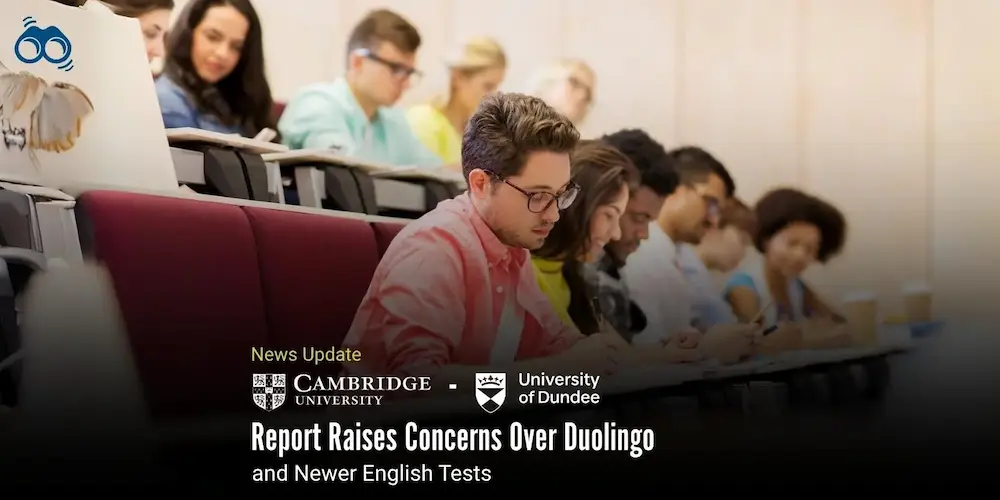Cambridge–Dundee Study Critiques Duolingo and OIEG English Language Assessments
Study Questions Readiness of International Students Admitted via Emerging Language Assessments
As more international students apply to UK universities using newer English tests like the Duolingo English Test and those from Oxford International Education Group (OIEG), a new study by the Universities of Dundee and Cambridge has sparked fresh debate about how reliable these tests really are. The report raises concerns about the security, accuracy, and how well these tests prepare students for academic success.
Based on feedback from 50 UK universities, the study points to issues with how prepared some students are when admitted through these alternative tests. While some critics argue the report relies too much on personal opinions and may be biased, since most of the authors are linked to IELTS, the researchers have defended their work. They say the findings are valuable and should help universities improve how they choose which English tests to accept.
The report identifies IELTS as the predominant benchmark for Secure English Language Testing (SELT), praised for its reliability, rigour, and widespread institutional acceptance. While tests such as TOEFL, C1 Advanced, and PTE are broadly recognised, Duolingo's English Test (DET) was reportedly accepted by only six UK universities at the time of review. Duolingo has responded by challenging the findings, pointing to global recognition, including acceptance by all Ivy League universities and a substantial number of Russell Group institutions, as evidence of its credibility and accessibility.
English language testing expert Michael Goodine added that criticism of newer tests, without comparative data, may overlook broader issues in language standard decline across the sector. Cambridge University Press & Assessment, which supported the study, confirmed its peer-reviewed status and rejected accusations of outdated or limited sampling. A study spokesperson clarified that contributors shared professional experiences concerning post-pandemic changes and evolving student capabilities, rather than commenting on specific tests alone.
Further findings revealed considerable concern over international students’ language proficiency levels, with 44% of university staff categorising academic literacy as ‘poor’, and just under 10% rating it as ‘good’. Pamela Baxter, Managing Director for IELTS at Cambridge University Press & Assessment, warned that admitting underprepared students jeopardises their academic success and places undue strain on institutional resources. She emphasised the high-stakes nature of language testing and the value that international students contribute to UK universities, representing 23% of the student body, while affirming the need for rigorous standards.
Additionally, the study highlighted a disconnect between university departments, where English for Academic Purposes (EAP) and academic staff prioritise test quality and student proficiency, whereas admissions teams often focus on cost-effectiveness and access. This divergence calls for a unified and balanced approach to test selection. The report arrives amid major developments in the UK's SELT sector, as the Home Office progresses its tendering process for a new English language assessment system, the Home Office English Language Test (HOELT). Recent rounds of market engagement have explored the feasibility of integrating remote and digital testing options into future frameworks. The study reinforces the pressing need for evidence-based policy and cohesive institutional alignment in English language admissions.
Editor’s Note:
The recent report by the Universities of Dundee and Cambridge has added to the ongoing conversation about how English language testing is handled in UK universities. It raises valid concerns about the reliability and academic strength of some newer tests, like the Duolingo English Test and those from the Oxford International Education Group (OIEG). However, it’s important to see these concerns in a bigger picture—one that includes changes since the pandemic, rising international student numbers, and the need for more inclusive and scalable testing options. At the same time, the report mostly relies on opinions and feedback from university staff rather than solid data or long-term results. This limits how much it can influence real change. To improve language standards and keep up with the changing needs of students and universities, stronger evidence is needed. While IELTS is still seen as a trusted standard, that shouldn’t stop the education sector from seriously considering new tests that are more affordable and easier to access.
Skoobuzz believes that the report encourages universities to rethink how they assess English skills, but that process needs to be open-minded and flexible enough to fit today’s global education environment.














0 Comments (Please Login To Continue)